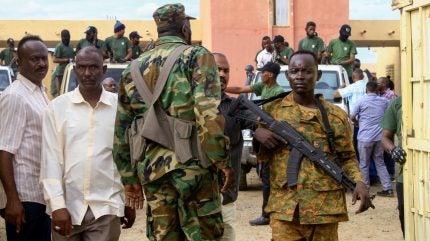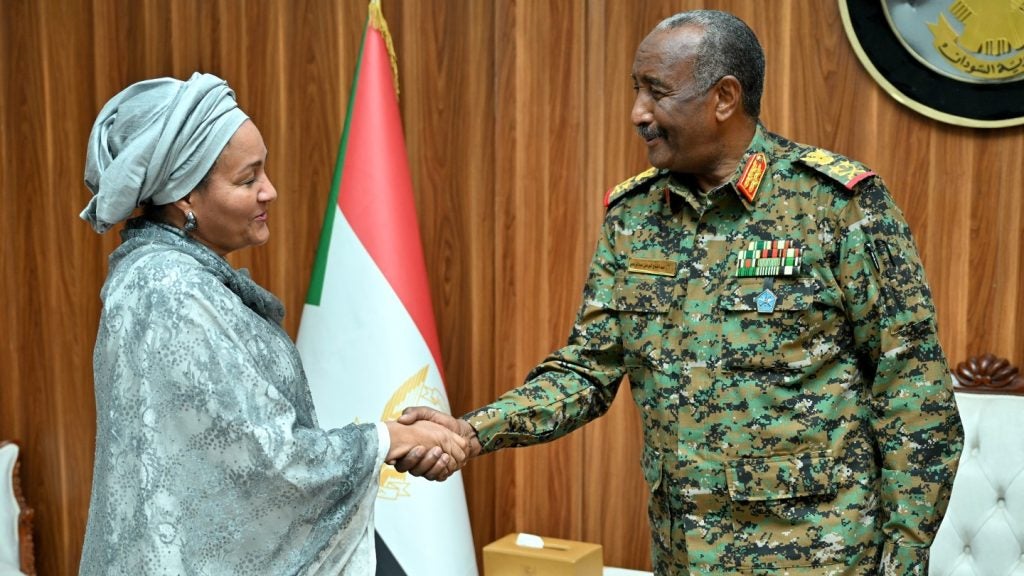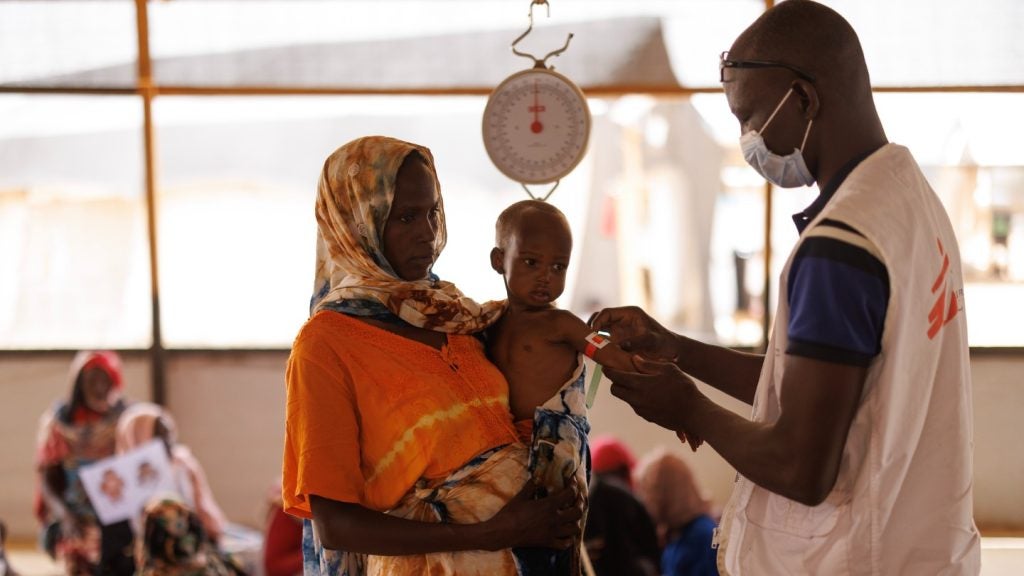
After nearly 18 months of displacement, starvation and genocidal violence, minimal attention has been paid to the bloody conflict still raging across Sudan – nor to the powers fuelling it.
An overarching narrative of ‘just another Sub-Saharan civil war’, this time between the Sudan Armed Forces (SAF) and Rapid Support Forces (RSF) paramilitaries, has set in. Those arming both sides have largely avoided scrutiny for the inhumane conditions imposed on the Sudanese people, now the “largest internally displaced population ever reported”, with ten million having fled their homes.
Earlier today (6 September), an independent UN fact-finding mission released a report on the “harrowing human rights violations” committed by both sides. 182 interviews with survivors, their relatives and witnesses reveal torture, attacks on civilians, rape and arbitrary arrests.
As more than half of Sudan’s population faces food insecurity, the situation is “close to breaking point”, an International Committee of the Red Cross (ICRC) spokesperson tells Army Technology.
To blame for arming both sides are manufacturers from the UAE, Russia, China, Serbia, Türkiye, and Yemen, which are among those “in flagrant breach” of the UN Security Council’s international arms embargo on Darfur, according to trade data and open-source intelligence analysis by Amnesty International.
Despite such investigations, weapons supplies continue to pour in from abroad.
A well-established ‘guns for gold’ network encompasses Emirati arms manufacturers, Russia’s Wagner Group and Sudanese fighters, with the precious metal giving the RSF paramilitary group financial self-sufficiency outside the military-financial complex.
The UAE imports “nearly all” of Sudan’s gold
Fighting first broke out in April 2023 across Khartoum, Sudan’s capital. It quickly spread to Darfur, North Kordofan and other areas under the directives of the SAF’s General Abdel Fattah al-Burhan and the RSF’s General Mohamed Hamdan Dagalo, also known as ‘Hemedti’.
Approximately 15,000 people have been killed in the 510 days since then – although this estimate has been contradicted by reports that the RSF and allied Arab militia carried out ethnic killings of 10,000 to 15,000 people in one Western Darfur city alone.

The same report said it was “credible” that the UAE had provided regular military support to the RSF’s stronghold via Amdjarass in northern Chad, an accusation made by a top Sudanese general in November.
The UAE’s operation has used an airfield and hospital in a remote town in Chad, just across the Sudanese border, to deliver military packages to RSF forces on a near-daily basis since June 2023, the New York Times reported. Emirati officials insist the operation is humanitarian.
In 2022, the UAE imported 39 tonnes of gold from Sudan, worth more than $2bn. While gold import figures for 2023 and 2024 are unavailable, direct shipments of Sudanese gold have continued.
In May 2023, the US State Department noting that the UAE receives “nearly all” the gold exported from Sudan. The UAE is also a primary customer of gold smuggled illegally from Sudan into Egypt, Ethiopia, Chad, Uganda and South Sudan.
The RSF has also received the bulk of Russia’s training and weapons, and, in return, Sudan’s gold has lessened the impact of Western sanctions on Moscow’s coffers amid the full-scale invasion of Ukraine.
Russia, however, has played both sides. Officials are in talks with the SAF about securing a Russian naval base on Sudan’s Red Sea coast, which the Sudanese army controls. President Putin has long pursued a Red Sea port to protect Russia’s economic interests and improve its military posture vis-à-vis the US in the region.
Emirati APCs to Turkish FD-63s
Amnesty International and UN experts are among those calling for an expansion of the weapons embargo beyond just Darfur.
“Our research shows that weapons entering the country have been placed into the hands of combatants who are accused of international humanitarian and human rights law violations,” says Deprose Muchena, Amnesty’s senior director for regional human rights impact. “We have methodically tracked a range of lethal weapons – including handguns, shotguns and rifles – that are being used in Sudan by warring forces.”
Through its illicit airbase and other entry points, the UAE is a key supplier of weapons and armoured personnel carriers (APCs) to the RSF.
Nimr Ajban APCs, first sighted in Sudan in 2019, have been identified across Khartoum and other parts of Sudan in videos verified by Amnesty.
In April 2024, a different video the SAF claims to have shot in Mellit, North Darfur, shows several types of APCs allegedly seized from the RSF, including Streit Gladiator & Cougar APCs, a Terrier LT-79 and several INKAS Titan-S. Other videos have identified at least one Shell Special Vehicles APC, another Emirati defence company.
“It is clear that the existing arms embargo that currently applies only to Darfur is completely inadequate, and must be updated and extended to cover the whole of Sudan,” Muchena adds. “This is a humanitarian crisis that cannot be ignored. As the threat of famine looms large, the world cannot continue to fail civilians in Sudan.”
The UAE is far from the only culprit. FD-63 shotguns made by Turkish manufacturer Dağlıoğlu Silah were identified in a video shot last year in Al-Daein, Darfur.
Sarsilmaz, Türkiye’s main small arms manufacturer, is a known SAF supplier, while smaller Turkish companies – such as BRG Defense and Derya Arms – have exported hunting shotguns and R56 rifles to Sudan.
Russian manufacturer Kalashnikov Concern has poured Saiga-MK .233 semi-automatic rifles into Omdurman, as well as Tigr designated marksman rifles (DMRs) into Khartoum and Nyala. Moscow-based Molot Arms has also distributed Vepr 1V-E rifles to Kassala and Omdurman.
None of the above companies responded to Army Technology when approached for comment on the identification of their weapons in Sudan.
“Unbearable”
These arms dealers seem unperturbed by the Sudanese people's suffering.
Mass starvation is the main concern among humanitarian organisations working on the ground in Darfur and the other worst-affected regions.
“The food crisis in Sudan, especially in conflict-affected areas like Al Fashir town, is getting much worse with thousands of families facing acute food insecurity,” says the ICRC spokesperson. “Barriers to the delivery of aid have worsened food shortages, pushing the country into a huge food crisis, as well as caused a breakdown in essential services like health care and water.”
In a country where 70% of the population relies on agriculture and livestock for survival, forced displacement has left the ten million internally displaced Sudanese people – three million prior to April 2023 and seven million since – malnourished and starving.

Shortages of water, fuel and medicine also leave Sudan’s population vulnerable to outbreaks of diseases including malaria and dengue fever.
“Access to safety, healthcare, food and water, humanitarian assistance and information, including news from their loved ones, have been largely impeded, making the day-to-day life of millions of Sudanese unbearable,” the ICRC spokesperson tells Army Technology.
Between 70% and 80% of Sudan’s healthcare facilities are no longer functioning, according to estimates by the ICRC and MSF. Those hospitals and medical encampments still operating are critically short of supplies and staff.
The UAE, meanwhile, stands accused of using a field hospital in Amdjarass, Chad, as a cover for its weapons supply to the RSF. It seems unlikely the Gulf state will heed the ICRC’s call to “spare hospitals and other essential civilian infrastructure from military operations.”
For defence companies, the final destination of weapons is often tricky to trace, and trickier still to control, but it remains undeniable that Emirati, Russian and Turkish manufacturers are complicit in the atrocities being committed by RSF and SAF.
Pressure now mounts on the UN Security Council to widen the arms embargo beyond Darfur, across Sudan – and hold the arms suppliers profiteering to account. At stake is the plight of the Sudanese people.





